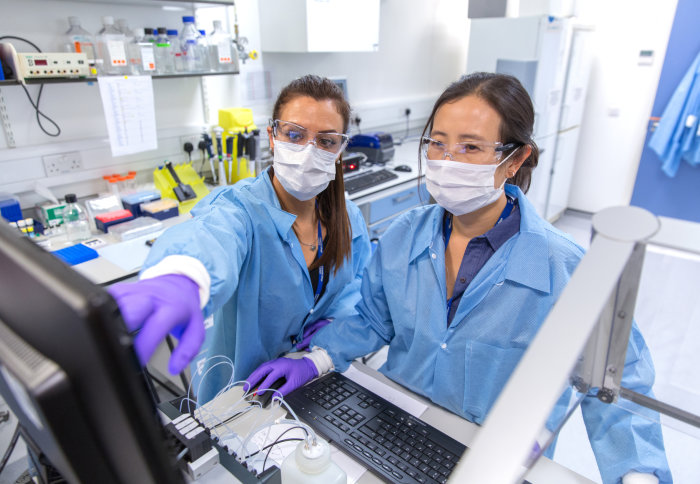Glycan microarrays for a new era of diagnostic tools

Imperial College London researchers have received a new £1.34M Wellcome Trust grant to support the world-leading Carbohydrate Microarray Facility.
The cross-faculty collaboration between the Department of Metabolism, Digestion and Reproduction and the Department of Chemistry, received a Biomedical Resource Grant from Wellcome Trust to help develop the next generation of carbohydrate-based diagnostics and therapeutics.
Project leads, Dr Yan Liu, Prof Ten Feizi, Dr Ben Schumann, Prof Phil Bennett and Dr Wengang Chai, hope the grant, together with the support of March of Dimes Centre grant, will further expand the Carbohydrate Microarray Facility and diversify its glycan collection.
Carbohydrates are much more than an energy source. Complex carbohydrate structures, also called glycans, are found on the surface of every single living cell, where they impact on a myriad of processes and contribute to the “identity” of a cell, a tissue or an organism. For example, the classification of the blood groups A, B and O is purely based on the presence or absence of certain glycan structures on the cell surface. Pathogens such as viruses, bacteria and parasites can bind glycan structures and use them to infect a cell.
The ability of a pathogen to infect a tissue generally depends on the presence of the ‘correct’ glycan structure, termed the ligand. Pinpointing the glycan ligands for pathogens using carbohydrate microarrays opens the way for designing therapeutic inhibitory compounds. There is no doubt that the next generation of diagnostics and therapeutics will rely heavily on glycans and the Carbohydrate Microarray Facility hopes to be at the forefront of those developments.
The Carbohydrate Microarray Facility has one of the largest glycan libraries in the world. The community need for glycan microarray analyses is reflected by requests from over 80 users/collaborators during the last three years to work with the Facility to identify binding partners of proteins, viruses and whole bacterial cells. The Facility also actively contributes to the development of the international glycan microarray data repository being developed in the GlyGen project of the NIH Commons Fund.
In 2020, the grant will enable the Facility to recruit a synthetic chemist, situated at the Department of Chemistry. A postdoctoral associate and a Carbohydrate Microarray Project Manager are currently being recruited and based in the Facility. Follow the links for more information.
Speaking about the grant and expanding the team, Dr Yan Liu said: "With the new team we are building in the Facility, we aim to foster interdisciplinary collaborative glycoscience and to contribute to the integration of glycomics into the new era of biology and medicine.”
Article supporters
Article text (excluding photos or graphics) © Imperial College London.
Photos and graphics subject to third party copyright used with permission or © Imperial College London.
Reporter
Benjie Coleman
Department of Surgery & Cancer